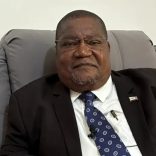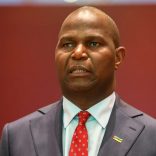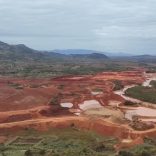Mozambique's Joaquim Chissano, Sao Tome's Maria Silveira win 2025 CPLP award
Mozambique: Secret debt special report – By Joseph Hanlon

In file CoM
Privinvest defence claims:
+ Payments not bribes
+ Nyusi solicited campaign contributions
+ Did Nyusi sabotage a Guebuza success?
+ Nyusi was deeply involved; lied to the PGR
+ Guebuza gets only partial let off
+ Ndambi Guebuza, Chang
+ Investing in property
5 cases in London courts
+ Creditors sue Credit Suisse
Privinvest claims payments were not bribes; says Nyusi lied to attorney general & sabotaged project to hit Guebuza
Privinvest, the Lebanon and UAE company that received most of the $2 billion secret loans, says “the payments made to the Mozambican officials were not bribes.” It also says President Filipe Nyusi was involved in the whole process, asked for and received money, and lied to the attorney general.
Privinvest claims that the maritime project was going to be hugely profitable and that it wanted to invest in Mozambique, but Nyusi sabotaged the project to spite Guebuza.
Privinvest submitted its defence to Mozambique’s legal action in the London High Court on 15 January. The full statement is HERE . Privinvest provides a whole list of payments, but says they were all legal – investments in companies of senior figures, consultancy fees, and campaign contributions. It details how the elite invests its winnings.
The Privinvest case is one of five now going on in London, and several in the United States. The $2 bn loans were negotiated in 2011-4 and kept largely secret until 2016. Their revelation caused an outcry by donors and the IMF, which triggered an economic catastrophe from which Mozambique still has not recovered. The loans were never approved by parliament, as required by the constitution, and the Constitutional Council on 8 May 2020 declared most of the loans “null and void”, meaning that the highest court in Mozambique has ruled that the loans and the guarantees should be treated as if they never existed.
The loans and bonds were organised mainly by Credit Suisse and also by the Russian bank VTB, and after they took their large fees, all of the money went directly to Privinvest. Unusually, not one penny went to Mozambique.
(What follows in Privinvest’s defence in a major lawsuit. All quotations are from the Privinvest defence. I make no comment on their accuracy. jh)
Claim Nyusi solicited campaign contributions
“President Nyusi, currently the head of Frelimo and the Republic’s executive government, was himself at the very centre of the matters now complained of by the Republic – he requested political campaign contributions from Privinvest, met directly with Mr Boustani in relation to those contributions and the Projects more generally, and was directly involved in the conception of the Projects in his then-role as Minister of Defence.” Jean Boustani was the Privinvest salesman who organised the package.
In 2014 “Privinvest also paid substantial sums both directly and indirectly for the benefit of President Nyusi,” including $10 mn to Frelimo for Nyusi’s election campaign. “At a meeting with Mr Boustani at Paris-Le-Bourget Airport on 1 August 2014, President Nyusi requested further campaign contributions and/or assistance from Privinvest. ”
Did Nyusi sabotage a Guebuza success?
“In January 2015, President Nyusi replaced former President Guebuza on the expiry of the latter’s second term. A power struggle ensued between them, in particular over control of Frelimo. As a result, and apparently in order to discredit former-President Guebuza and serve President Nyusi’s own political and business objectives, the Republic and the SPVs [special project vehicles – Ematum, MAM and Proindicus] jettisoned the Projects. They refused to enable Privinvest to complete its work.”
“President Nyusi’s commercial interests were best suited by causing the Projects to fail. … A company owned by President Nyusi’s son, Florindo, called Motil Moçambique … is understood to have sold its fishing quotas to a Chinese company. This company would otherwise have competed with Ematum.”
Nyusi was deeply involved and lied to the attorney general
“President Nyusi (the former Minister of Defence, and current head of both Frelimo and the Republic’s executive government) was fully aware of, and/or participated, in it, and indeed was at the heart of the matters now complained of by the Republic. He … was directly involved in the conception of the Projects in his then-role as Minister of Defence.”
“President Nyusi was at all material times aware of the Projects, the financing thereof, and the nature of the goods and services supplied by Privinvest, in particular because:
+ He was a member of the CCFDS [Joint Command of Defence and Security Forces – Comando Conjunto das Forças de Defesa e Segurança], which decided to procure the Proindicus Project;
+ He was Minister of Defence at a time when his ministry owned 50% of Proindicus and a stake in MAM;
+ He asked [Finance Minister Manuel] Chang to sign the Guarantees, …
+ He had supervisory responsibility for the Mozambican Navy, which was critically involved in all three projects, and in particular the MAM Project”
“The CCFDS included among its membership former President Guebuza (in his capacity as Commander-in-Chief of the Mozambican Armed Forces), President Nyusi (in his then capacity as Minister of Defence), the Minister of the Interior, Mr Leão (in his capacity as Director-General of SISE) and the Chief of Staff of the Armed Forces.”
From “President Nyusi’s receipt of payments [it] is to be inferred that President Nyusi was aware of the payments being made by Privinvest to the Mozambican Officials. … President Nyusi had knowledge of … payments in respect of the Mozambican Officials, the Consultants, himself and Frelimo.”
“In August 2018, President Nyusi gave a statement to the PGR [attorney general] in the course of its investigation. In that statement, President Nyusi stated that: (i) he was not aware of the Guarantees or any other instrument by which the Republic assumed obligations in respect of debts owed to Credit Suisse; (ii) he was unaware of the existence of EMATUM and MAM; (iii) he had no control or oversight over the process of negotiating or approving the Projects. … That evidence was substantially false.”
Making links
Privinvest says that Bousanti’s first contact was with “Ms Basetsana ‘Bassy’ Thokoane. Ms Thokoane was a former agent in the South African intelligence services, and had connections in Mozambique. … Mr Boustani travelled to Mozambique in March 2011, where he was introduced to Mr [Cipriano] Mutota by Ms Thokoane, and in turn to Mr [Teófilo] Nhangumele by Mr Mutota.” Privinvest identifies Mutota as a serving SISE officer and says he and Nhangumele run a business called Mulepe. Nhangumele became the main contact. A visit to Privinvest shipyards was organised for do Rosario, Nhangumele, President Guebuza’s son Ndambi and Bruno Langa (described “as being able to assist with in-country lobbying efforts”). Privinvest in its defence admits it listed Nhangumele, Ndambi Guebuza, and Langa as employees of one of its companies, but they did no work.
“It was and is lawful as a matter of Mozambican law to make payments to consultants for the purpose of lobbying the government and/or assisting in interactions with the Republic’s government. … Further, it was expressly represented to Mr Boustani that it was lawful both for Privinvest to go into business with serving government officials, and for it to make campaign contributions to them.”
“It is common practice, when doing business with governments in general and in developing markets in particular, including the Republic, for a foreign investor or contractor to engage consultants to assist in navigating local bureaucracy, effect introductions and conduct marketing and public relations activities, … Privinvest itself had not done business in Mozambique before and therefore had no pre-existing understanding of the complex political, cultural and business dynamics of Mozambique at the relevant time.” Privinvest says it entered into a consultancy contract with Nhangumele and Langa, paying what was in effect a success fee, and each were paid $8.5 mn.
But that did not turn out well for Privinvest, which alleges that it had to pay Nhangumele even though he “had by that time stopped providing services to Privinvest; Mr Nhangumele was not in any event proving to be an effective lobbyist with the Republic’s government.”
“The Projects were principally operated by and through the Republic’s intelligence service, SISE. In particular, … Mr [Gregorio] Leão (in his capacity as Director-General of SISE) [Serviço de Informações e Segurança do Estado] appointed Mr [António Carlos] do Rosário to supervise the Projects on behalf of the Republic and SISE. …. Mr do Rosário was a key point of contact for Privinvest.”
Guebuza gets only partial let off
Privinvest puts most of the blame on Nyusi and not Guebuza. Privinvest “does not aver that any of the sums paid to the Consultants or Mr Ndambi Guebuza were received by and/or led to a direct or indirect economic benefit to former President Guebuza.”
But he does not get off free. “Mr Boustani was frequently during the period January 2013- late 2014 based in Maputo at the Radisson Hotel, and met with former President Guebuza, Mr Chang, Mr Leão and Mr do Rosário either at that hotel, in restaurants or at their homes or the homes of their family/friends.”
“Former President Guebuza had knowledge of … payments in respect of the Mozambican Officials, the Consultants, Mr Ndambi Guebuza, President Nyusi and Frelimo.”
Ndambi Guebuza
“Privinvest considered that Mozambique had extensive economic potential that was attractive to foreign investors, consistent with wider press reports about the significant economic potential in Mozambique at the time. … Part of Privinvest’s commercial strategy in relation to Mozambique was that it would enter into other long-term business ventures in Mozambique and elsewhere. The Guebuza family, and in particular Mr Ndambi Guebuza and his sister Valentina, owned various substantial businesses operating in Mozambique and other parts of Africa.”
“Privinvest entered into a number of business ventures with Mr Ndambi Guebuza and companies owned or controlled by him. …These were in connection with independent business ventures, and not to exert any actual or perceived influence on the Republic’s government.” There was, claims Privinvest, no conflict of interest.
One company is Now PrePay, 87% owned by a Privinvest company Quilua and 10% by “Vivre Consultoria-Sociedade Unipessoal Limitada (a Guebuza family investment vehicle)”. Also $8.2 mn was paid to set up a South African real estate trust with Ndambi; the project never went ahead and the money has never been returned.
Privinvest “investments”
“It was intended more generally that Mr do Rosário would: (i) co-ordinate the selection and making of many of Privinvest’s investments in Mozambique (even where he did not have a direct economic interest therein); and (ii) manage those investments so far as necessary. … For this purpose, Mr do Rosário and Mr Boustani discussed and agreed the amounts which Privinvest was willing to invest in these ventures. Mr do Rosário, however, had primary responsibility for how funds sent by Privinvest were used, and Privinvest would typically send funds for this purpose as requested from time to time by Mr do Rosário. Privinvest reposed considerable trust and confidence in Mr do Rosário to this end.” Thus here are no accurate accounts of these transfers.
“Payments made were not always immediately applied to a particular investment. In so far as they were held on account, they were subsequently used for various purposes including the construction work on Ematum’s offices … and the campaign donation made to President Nyusi. … From time to time, the withdrawal of certain funds in cash, which were then paid to SISE.” At least $10 mn was also donated to Frelimo.
“Mr do Rosário also handled payments made by Privinvest for investments being made jointly with Mr Leão (in view of their close relationship), Txopela and Quilua.”
“Privinvest incorporated a holding entity in Mozambique called Quilua Holdings Investments SA (‘Quilua’)” as joint venture between Privinvest, Chang, do Rosário and Leão. 80% of Quila is owned by Privinvest companies and the rest by Anlaba (owned or controlled by Leao), Pantera (owned or controlled by Chang), and Txopela (owned or controlled by do Rosario).
Buying property
A series of properties were purchased and registered to do Rosario personally, with the “intention” that they would be re-registered to his company Txopela. In Maputo these included:
+ Houses on Rua Caracol and Rua da Gorongosa ($2.3 mn)
+ Two apartments in Polana Shopping Centre and one in the Jacaranda Building ($280,000 each).
+ Four plots of land intended for a “significant tower block” ($1.6 mn)
As well as investments for the building of hotels in Tete and Belo Horizonte (near Maputo).
Investment with Anlaba and Leao included five houses in Costa do Sol, Maputo, two new houses in Ponta D”Ouro, and a house in Quelimane.
Manuel Chang
Privinvest notes the importance of Manuel Chang. For example, “Mr Chang also noted that, because of the constraints on the Republic’s borrowing on commercial terms imposed by the IMF, an alternative solution would be devised using an SPV.” Chang proposed investments to Boustani who paid him $7 mn for investments in real estate, a bank, and a proposed public-private sovereign wealth fund.
“Subsequently, Mr Chang indicated to Mr Boustani that he intended to run for membership of the National Assembly, and requested that Privinvest donate to his campaign.”
Renato Matusse
Renato Matusse, a former advisor to President Guebuza, was paid $1.5 mn “initially intended as payments on account to Mr Matusse to act as a deal arranger for Privinvest’s intended acquisition of Televisão Independente de Moçambique (“TIM”). The transaction never came to fruition.” Next it was passed to use the money for a diamond mine, where Matusse had a concession for 21,600 hectaries in Machaze, Manica, and Massangena, Gaza (on two sides of the Save River). That did not work either. The money was never returned, Privinvest admits.
Some blame for Credit Suisse
“Due diligence is understood to have been conducted … by both Credit Suisse (including persons other than the CS Deal Team) and VTB. … In doing its due diligence, Credit Suisse would and did require to be satisfied that the contract price under the Proindicus Supply Contract reflected genuine provision of goods and services.”
Other points
Overpriced?: Kroll in its audit argued that Privinvest was charging double or more what items provided should have cost. The response is that “Privinvest was entitled, as a contractual counterparty, to negotiate the best price that the Republic and/or the SPVs were willing to pay.”
Privinvest claims it delivered everything that was ordered, although it admits that some drones were only supplied last year (2020). And for the first time provides a full list of the equipment: fishing boats; trimarans with drones; interceptor vessels; offshore patrol vessels; radar stations; light maritime patrol aircraft; a command, control and training centre; training; and a satellite surveillance system.
No money to Mozambique: “The entire purchase price was payable upfront because there were very high initial costs to Privinvest … Further, Credit Suisse insisted that it should be paid upfront, because it wanted Privinvest and not its borrower to bear the commercial risk of cost overruns on the Project. … Once funds had been disbursed, Credit Suisse could sell the debt.”
Could Mozambique have forced the gas companies to use MAM? Despite arguments that foreign gas companies would never agree, Privinvest accuses Mozambique of “(i) failing to require oil and gas companies operating within the EEZ [exclusive economic zone] to contract with MAM for the supply of logistics support and services, as well as offshore maintenance for their installations; (ii) more particularly, failing to insist that an offshore platform installed by Daewoo, around the time of the completion date of the MAM Project, use MAM for its offshore logistics services; (iii) failing to establish an offset programme (which Privinvest had originally proposed) requiring the purchase of services from MAM by foreign companies in the area generally.”
Creditors sue Credit Suisse
Credit Suisse established a syndicated loan, in which investment companies and banks took on pieces of the secret debt. Two London based companies, Beauregarde Holdings and Orobica Holdings, on 17 December 2020, sued Credit Suisse. The two companies call themselves the ProIndicus Institutional Lenders Group, and claim combined $30m interest in the loans which they acquired between 2018 and 2020. The companies alleged that they were given fraudulent misrepresentations by Credit Suisse, and did not know that the loans were tainted with corruption. Beauregarde is a UK registered company whose directors are Cayman Island-based companies and Orobica Holdings LLC is a Delaware (US) registered company. (Spotlight on Corruption) Beauregarde Holdings LLP & Anor. v Credit Suises
5 secret debt cases in London
There are four other secret debt cases in the London courts, according to Spotlight on Corruption:
Mozambique v Credit Suisse & Ors and Mozambique v Safa: These two cases have been linked because they are similar. In one the Mozambique government is suing the Credit Suisse, Privinvest and three former London-based employees of Credit Suisse. Privinvest’s defence is its response to this case. In the other, Mozambiquet is suing Iskander Safa, the owner of Privinvest, for conspiring with Credit Suisse and high-ranking bankers to bribe Mozambican officials.
VTB Capital PLC v Mozambique: The British subsidiary of Russian bank VTB, one of the lending banks in the loan scandal, is suing the Mozambican government for loans of $670 million to be repaid through enforcing the guarantees ruled illegal in Mozambique.
Banco International de Mocambique SA v Credit Suisse: The Mozambican investment bank BIM has one of the syndicated loans, is bringing a case against Credit Suisse, seeking repayment of $58.7m which formed part of one of the loans to the state-owned companies (SPV). The state-owned company had repaid $2.5m to BIM, but had defaulted thereafter. As at April 2020, the total sum owed to BIM (including interest) was nearly $80m.
By Joseph Hanlon













Leave a Reply
Be the First to Comment!
You must be logged in to post a comment.
You must be logged in to post a comment.